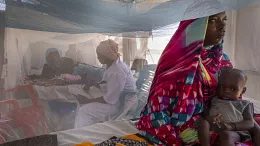Africa
UN Condemns Sudan Massacre: RSF Paramilitary Attack Leaves 100 Dead

The people of Sudan are still facing horrific violence and the looming threat of famine, as highlighted by UN humanitarians on Friday (07 Jun).
Reports of a deadly attack on a village south of Khartoum, which resulted in over 100 casualties, including 35 children, have drawn condemnation from UN Secretary-General and UNICEF. In another conflict zone in North Darfur, around 800,000 civilians are at risk due to intensified fighting between the Sudanese Armed Forces and the Rapid Support Forces.
The UN is struggling to access the area, and urgent aid is needed to address the skyrocketing prices of essential items like water and fuel.
The conflict, which began on 15 April 2023, has led to nearly 10 million internally displaced persons in Sudan, with food insecurity driving many to flee. Additionally, over two million people have sought refuge in neighboring countries, facing extreme vulnerability and trauma.
Chad had already been hosting over 400,000 Sudanese refugees before the current crisis, as Mr. Ba pointed out, expressing gratitude for the authorities’ decision to keep their borders open. However, meeting the refugees’ essential needs like shelter, food, education for children, and psychological support has become increasingly difficult due to funding shortages.
The UNHCR stated that the response plan for the five neighboring countries hosting Sudanese refugees, totaling $1.4 billion, is only nine percent funded. The humanitarian response within Sudan itself is funded at just 16 percent.
Meanwhile, the World Health Organization (WHO) raised concerns about the severe health situation in Sudan, which is further worsening the humanitarian crisis.
“The health system in Sudan is on the verge of collapse,” said WHO spokesperson Christian Lindmeier, highlighting that 65 percent of the population lacks access to healthcare.
“Health services in Sudan used to heavily rely on Khartoum, where the healthcare system has been severely weakened,” Mr. Lindmeier explained. “Only a quarter of the required medical supplies are available in the country. In remote areas, only 20 to 30 percent of health facilities are operational, and even then, at a minimal capacity.”
The WHO spokesperson also warned of a significant increase in measles cases in 2023 due to declining vaccination rates caused by the conflict.
“Unfortunately, we anticipate an even worse situation in 2024,” he added.
WHO also highlighted the rising cases of cholera, malaria, and dengue, expressing worries about the lack of treatment for individuals with chronic conditions like diabetes, hypertension, heart diseases, and kidney failure.
